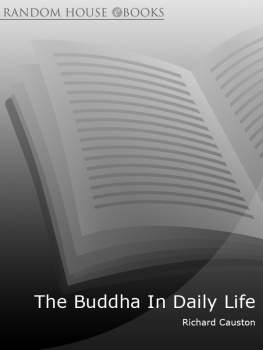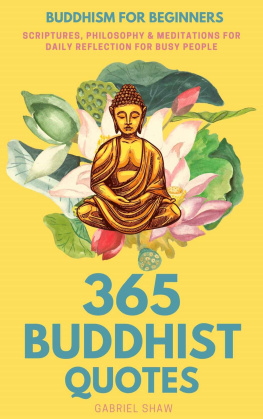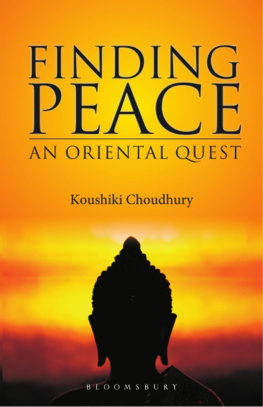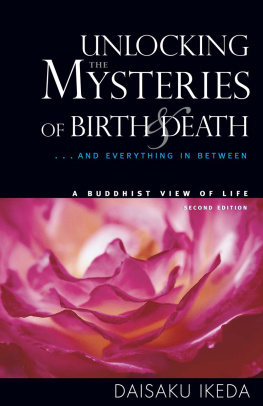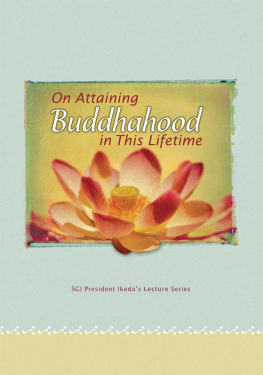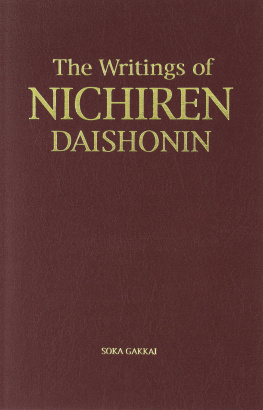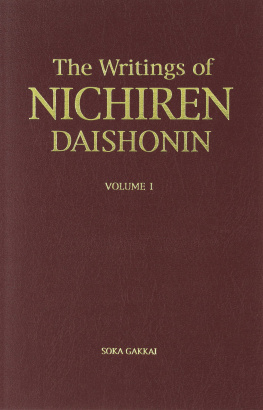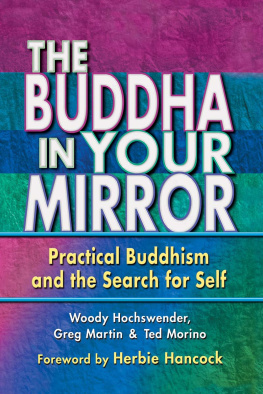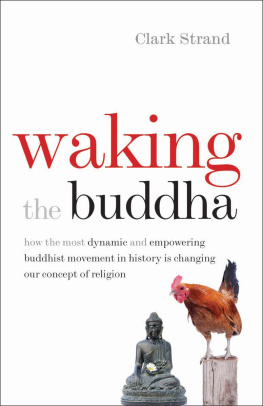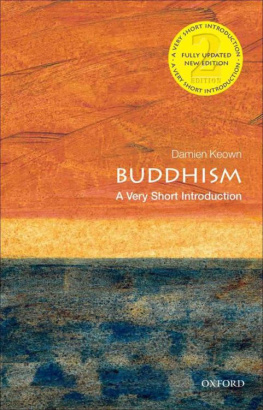
THE BUDDHA IN
DAILY LIFE
AN INTRODUCTION
TO THE BUDDHISM OF
NICHIREN DAISHONIN
Richard Causton

This eBook is copyright material and must not be copied, reproduced, transferred, distributed, leased, licensed or publicly performed or used in any way except as specifically permitted in writing by the publishers, as allowed under the terms and conditions under which it was purchased or as strictly permitted by applicable copyright law. Any unauthorised distribution or use of this text may be a direct infringement of the authors and publishers rights and those responsible may be liable in law accordingly.
Version 1.0
Epub ISBN 9781446489192
www.randomhouse.co.uk
This edition published in 1995 by Rider, an imprint of Ebury Publishing First published as Nichiren Shoshu Buddhism by Rider in 1988
Ebury Publishing is a Random House Group company
Copyright SGI-UK 1995
Richard Causton has asserted his right to be identified as the author of this Work in accordance with the Copyright, Designs and Patents Act 1988.
All rights reserved. No part of this publication may be reproduced, stored in a retrieval system, or transmitted in any form or by any means, electronic, mechanical, photocopying, recording or otherwise, without the prior permission of the copyright owner.
The Random House Group Limited Reg. No. 954009
Addresses for companies within the Random House Group can be found at: www.rbooks.co.uk
A CIP catalogue record for this book is available from the British Library
ISBN 9780712674560
To buy books by your favourite authors and register for offers, visit www.rbooks.co.uk
Contents
About the Author
Aged twenty-five, and after three years of active service in Burma, Richard Causton returned to England in 1945 with the realization that the world of his early youth had gone forever. The principles and beliefs on which he had been brought up, even the very existence of a loving and all-merciful God all were in doubt.
In 1958 he seized the chance of early retirement from the army, where, in his last post in the War Office, he was compelled to face for the first time the use of nuclear weapons and their appalling potential. At thirty-eight he began a fresh career in business.
In the 1960s, his business travels took him back to the Far East, where he encountered the Buddhism of Nichiren Daishonin in Japan. He describes it as an electrifying experience. All that he heard and read seemed exactly to match the beliefs and conclusions towards which he had already been moving. He began to practise and in 1971, aged fifty-one, he made his final commitment to the Buddhism of Nichiren Daishonin.
In 1974 he returned to England to join the 200 or so pioneer members practising here at that time. Three years later he gave up business to become the first permanent staff member of what was then called Nichiren Shoshu of the United Kingdom (NSUK) and is now known by the name Soka Gakkai International of the United Kingdom (SGI-UK). He was head of SGI-UK between 1975 and 1995 and a vice chairman of both the worldwide lay society, Soka Gakkai International, and its European arm, SGI-Europe until his death on 13 January 1995.
About the Book
Perhaps because it does not involve conforming to a specific lifestyle, the Buddhism of Nichiren Daishonin has attracted millions of adherents around the world during recent years. Its message is simply that those who commit themselves in faith, study and practice will achieve their goals and be moved to dedicate themselves to the wider cause of human happiness, world peace and environmental harmony.
In this comprehensive and helpful book, the late Richard Causton, chairman of the lay society of those who practice the Buddhism of Nichiren Daishonin in the UK, explains the teachings and practice of the movement. He sets it into its international and historical perspective and gives many examples of how individuals and their families can overcome their problems and begin to reveal their full potential.
the Buddha is life itself
Daisaku Ikeda
Acknowledgements
Due to my rather hectic schedule and frequent travels, I asked one of my fellow Buddhists, Edward Canfor-Dumas, if he would be willing to undertake writing the first draft manuscript of this book. As a professional writer, this might have been difficult for him, but he readily accepted, carrying out his task whole-heartedly, although it must sometimes have been irksome for him to have to accept the corrections and changes which I made. I thank him with all my heart for his patience, for without him this book could never have been completed in the time available.
I also wish to record my thanks to Pat Allwright and to Barbara Cahill, for their invaluable comments on the manuscript, as well as to the late Oliver Caldecott of Century Hutchinson for his unfailing enthusiasm and warm encouragement.
Most important of all, I express deepest gratitude to Daisaku Ikeda, president of our worldwide lay society, Soka Gakkai International, who is my master/teacher in life and from whom I have learned everything.
Richard Causton
References
The author gratefully acknowledges permission to quote from the following works:
Major Writings of Nichiren Daishonin, Vols. 14, Nichiren Shoshu International Center (NSIC), Tokyo, 1979/81/85/86.
By Daisaku Ikeda:
A Lasting Peace, Wetherhill, New York, 1981.
Before It Is Too Late (with Aurelio Peccei), Macdonald, London, 1984.
Buddhism and the Cosmos (with Masayoshi Kiguchi & Eiichi Shimura), Macdonald, London, 1985.
Buddhism in Action, Vols. 12, NSIC, Tokyo, 1984/85.
Human Values in a Changing World (with Bryan Wilson), Lyle Stuart, Seacaucus, 1984.
Life, An Enigma, a Precious Jewel, Kodansha, Tokyo, 1982.
Man Himself Must Choose (with Arnold Toynbee), Kodansha, Tokyo, 1976.
Selected Lectures on the Gosho, Vol. 1, NSIC, Tokyo, 1979.
Alexander Borbly (trans. Deborah Schneider), The Secrets ofSleep, Longman Scientific and Technical, London, 1987.
Jacob Bronowski, The Ascent of Man, BBC Enterprises, London, 1973.
Ronald W. Clark, The Life of Bertrand Russell, Jonathan Cape and Weidenfeld & Nicholson, London, 1975.
Paul Davies, God and the New Physics, Pelican, London, 1984.
Satoru Izumi, Guidelines of Faith, Tokyo, 1980.
By Yasuji Kirimura:
Buddhism and the Nichiren Shoshu Tradition, NSIC, Tokyo, 1986.
Fundamentals of Buddhism, NSIC, Tokyo, 1977.
Outline of Buddhism (ed.), NSIC, Tokyo, 1981.
The Three Calamities and Seven Disasters, Seikyo Times Special Issue, World Tribune Press, Santa Monica, 1986.
Primo Levi, If This Is A Man/The Truce, Abacus, London, 1987.
By Bertrand Russell:
A History of Western Philosophy, George Allen & Unwin, London, 1946.
Why I Am Not A Christian (ed. Paul Edwards), George Allen & Unwin, London, 1957.
Tom Wolfe, The Right Stuff, Jonathan Cape, London, 1979.
Preface
Despite all the advances made by science and technology during the past hundred years, we live in a world where human suffering has never been greater. It is estimated that, every day, some 40,000 children die of hunger or hunger-related diseases; that more than 750 million people in the world lack the nourishment to sustain a healthy life; that over 72 million people have been killed in armed conflicts this century, more than in all previous centuries put together; and that, since the end of the Second World War, there have been more than 200 armed conflicts, internal and international, many of which are still being fought. Even in the wealthiest, most advanced countries, millions are unemployed, poverty and crime are increasing, and though more people are materially better off than ever before, the symptoms of inner suffering divorce, drug and alcohol abuse, depression and suicide are all escalating at an alarming rate.
Next page
